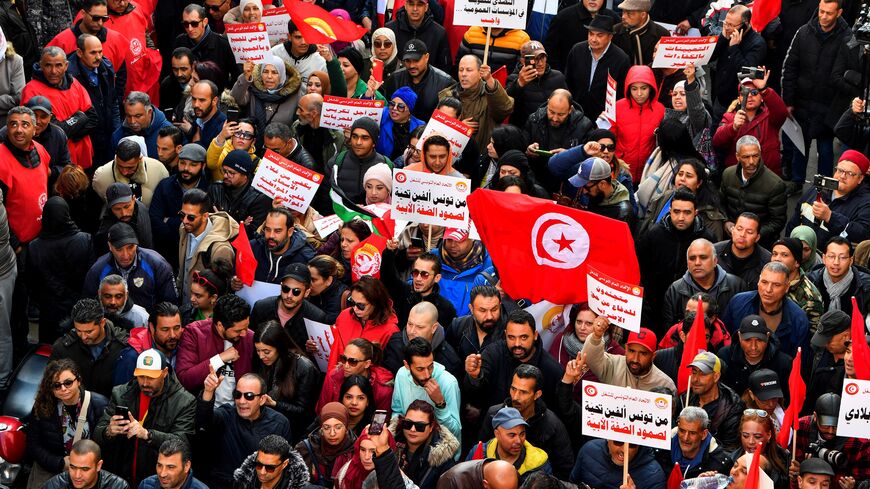PARIS — After its recent slide toward authoritarianism, Tunisia's latest turn in the spotlight has come courtesy of anti-immigrant rhetoric from its president.
Tunisia was the very country that started the Arab Spring in December 2010, when street vendor Mohamed Bouazizi set himself ablaze. Democratic governance survived there long after other Arab upheavals melted into civil strife, armed jihad or military dictatorship. Populist candidate Kais Saied won the presidential election in October 2019 by a landslide, in reaction against a corrupt and inefficient parliament.
But the former law instructor dissolved the parliament in July 2021. Since then he has ruled by decree, putting the former independent judiciary under his control and jailing dozens of judges. The turnout for the January 2023 parliamentary elections was only 11%, and since then an array of political figures have been arrested, dubbed terrorists or agents of foreign conspiracies, while judges who might release them were called “would-be accomplices.”
In this context, Saied made a stir as he used strong-worded language against “hordes ("jahafil" in Arabic — a term used for locusts) of Africans” whom he accused of distorting Tunisia's “Arab and Islamic identity.”
Saied won his initial support from the extreme-right circles of Europe, who lauded him as an ally in their crusade against the immigrants crossing the Mediterranean, dubbed “the Great Replacement” of Europeans by those of African, Arab or Asian descent. The European Union had long used the Arab states of North Africa as a bulwark against sub-Saharan undocumented migration, while those very Arab countries were themselves exporting millions of their unemployed populations to Europe.
Harsh treatment, beatings and even the auction of Black laborers in Libya made the news. French-speaking Black domestic help has become customary for Moroccan middle-class families, and unskilled Sahelian workers do menial jobs in Algeria, where the economy is boosted by the post-Ukraine war oil-rent . This significant sub-Saharan presence is also reinforced by wealthy patients seeking medical treatment in Tunis or Casablanca, and students attending Francophone universities when they cannot obtain visas for Europe.
The African Union demanded apologies for Saied's threatening words, and thousands of demonstrators took to the streets to chastise racism. They also reminded the president — who is fair-skinned, like many in the ruling elite — that much of the southern and inland indigenous Berber population is brown-skinned and has been long marginalized and despised by the coastal “whites.” That race issue was actually a significant factor at the inception of the Arab Spring — self-immolated Mohamed Bouazizi was brown, and so was former President Moncef Marzouki, who claimed his complexion as an advantage over his fair-skinned competitors within the ruling coalition after the October 2011 general elections.
Within the dire domestic situation of Tunisia, the scapegoating of the African “hordes” looks like ordinary political tactics. Will it reinforce the presidential camp and coalesce around him a populace who can hardly make ends meet? Or, on the contrary, can it rally his opponents, including in the middle class of professionals, journalists and civil servants who were targeted by the arrest waves, around the powerful UGTT workers union and its charismatic leader, Noureddine Taboubi?
Much will depend upon the military, which has traditionally kept out of politics, but ultimately threw its weight to oust former dictator Zine El Abidine Ben Ali in January 2011. Another part of the answer lies in Europe, on which Tunis is highly dependent financially and politically. Though much of the press criticized Saied’s speech, if Tunisia can stop the flow of undocumented immigrants to Europe, it might well bring him some backhanded support from European governments that are confronted with daily illegal crossings at their borders.







